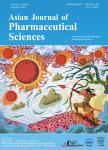Lipid nanoparticle-mediated CRISPR/Cas9 gene editing and metabolic engineering for anticancer immunotherapy
作者机构:College of Pharmacy and Research Institute of Pharmaceutical SciencesSeoul National UniversitySeoul 08826Republic of Korea
出 版 物:《Asian Journal of Pharmaceutical Sciences》 (亚洲药物制剂科学(英文))
年 卷 期:2022年第17卷第5期
页 面:641-652页
核心收录:
学科分类:1002[医学-临床医学] 07[理学] 070205[理学-凝聚态物理] 08[工学] 080501[工学-材料物理与化学] 0805[工学-材料科学与工程(可授工学、理学学位)] 100214[医学-肿瘤学] 0702[理学-物理学] 10[医学]
基 金:by grants from the National Research Foundation,Ministry of Science and ICT,Republic of Korea(NRF-2021R1A2B5B03002123,NRF-2018R1A5A2024425,NRF-2021K2A9A2A06044515,2022M3E5F1017919) Ministry of Education,Republic of Korea(NRF-2021R1A6A3A01086428) Korean Health Technology R&D Project(No.HI19C0664),Ministry of Health&Welfare,Republic of Korea
主 题:Gene editing Lipid nanoparticle Metabolic engineering Lactate dehydrogenase A Tumor microenvironment
摘 要:Metabolic engineering of the tumor microenvironment has emerged as a new *** dehydrogenase A(LDHA)is a prominent target for metabolic ***,we designed a cationic lipid nanoparticle formulation for LDHA gene *** plasmid DNA delivery efficiency of our lipid nanoparticle formulations was screened by testing the fluorescence of lipid nanoparticles complexed to plasmid DNA encoding green fluorescence protein(GFP).The delivery efficiency was affected by the ratios of three components:a cationic lipid,cholesterol or its derivative,and a fusogenic *** lipid nanoparticle designated formulation F3 was complexed to plasmid DNA co-encoding CRISPR-associated protein 9 and LDHA-specific sgRNA,yielding the lipoplex,pCas9-sgLDHA/*** lipoplex including GFP-encoding plasmid DNA provided gene editing in HeLa-GFP *** of B16F10 tumor cells with pCas9-sgLDHA/F3 yielded editing of the LDHA gene and increased the pH of the culture ***9-sgLDHA/F3 treatment activated the interferon-gamma and granzyme production of T cells in *** vivo,combining pCas9-sgLDHA/F3 with immune checkpoint-inhibiting anti-PD-L1 antibody provided a synergistic antitumor effect and prolonged the survival of tumor model *** study suggests that combining metabolic engineering of the tumor microenvironment with immune checkpoint inhibition could be a valuable antitumor strategy.



